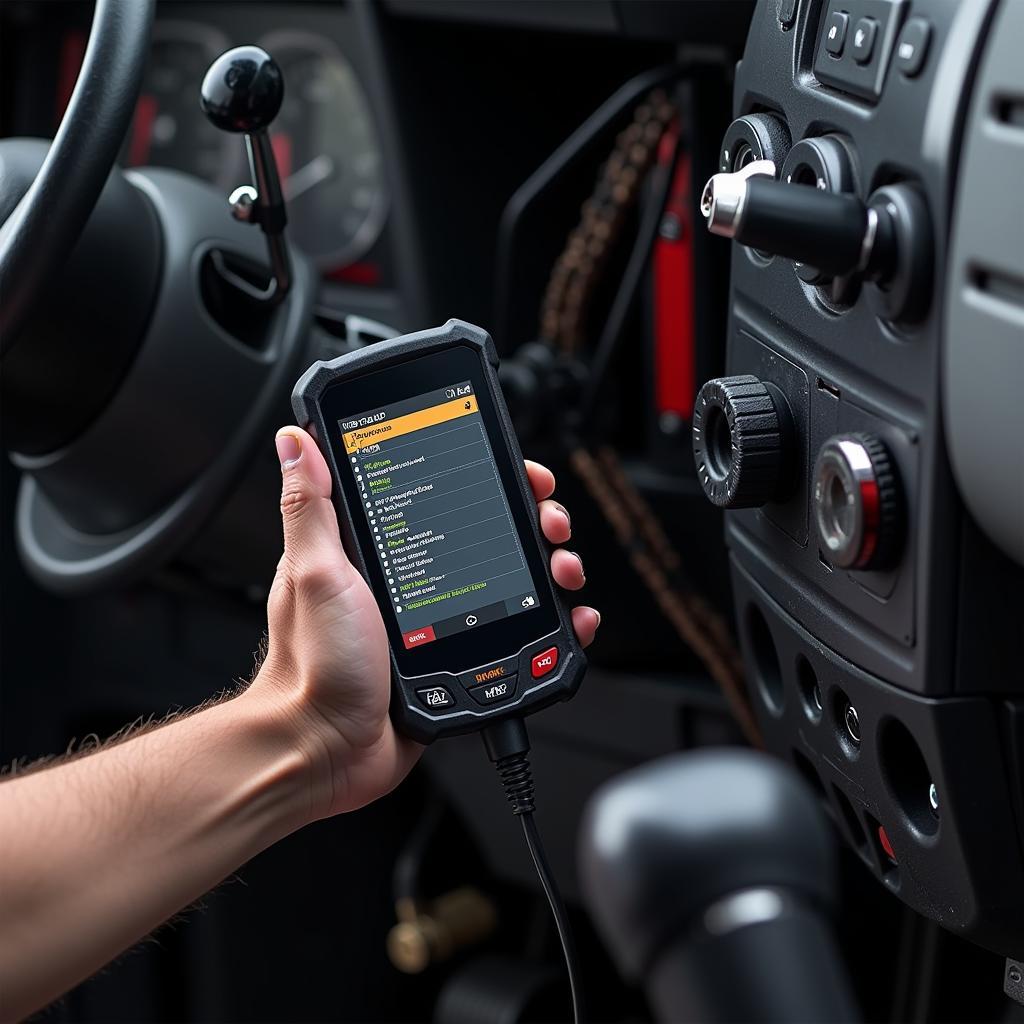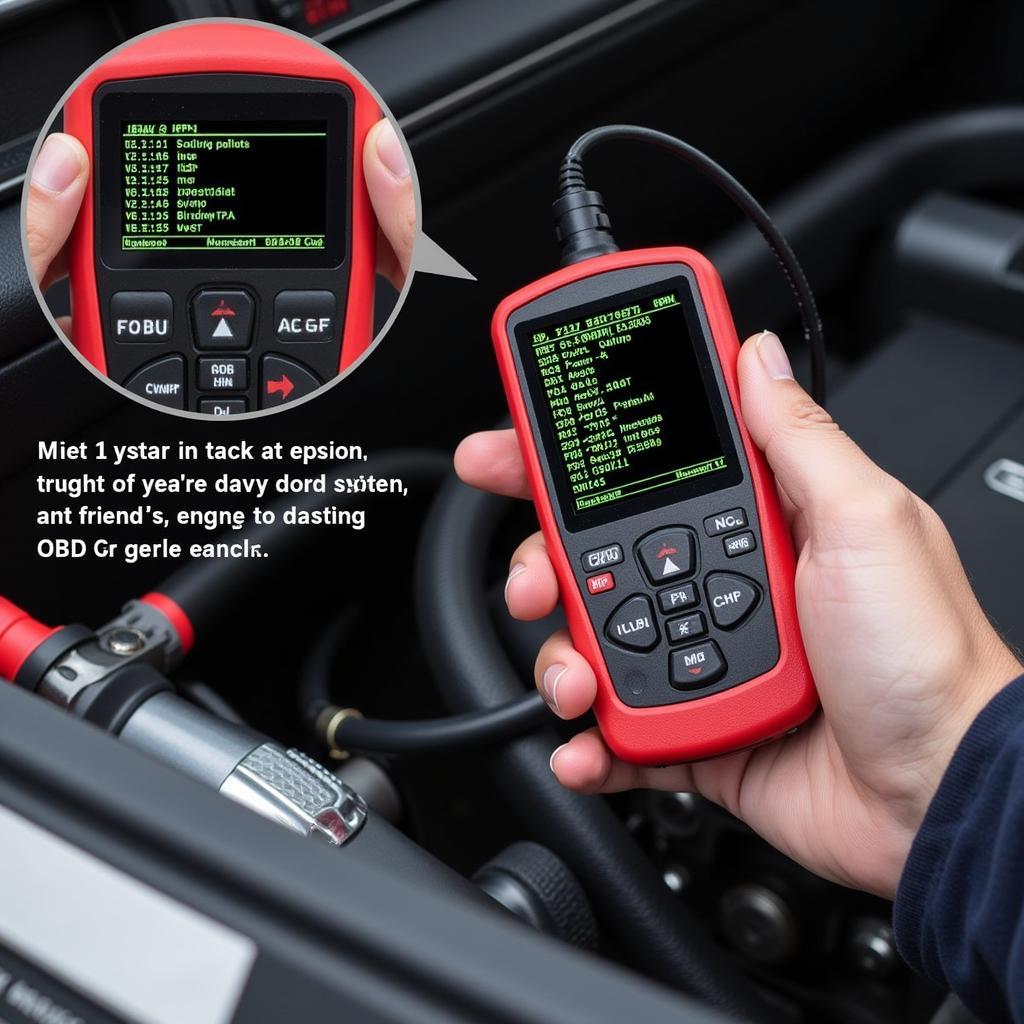Heavy duty vehicles, often called commercial vehicles, are essential for many industries, including transportation, construction, and agriculture. These vehicles are built to withstand heavy loads and demanding conditions, but even they can experience issues. Diagnosing and troubleshooting problems in these vehicles can be challenging, especially when it comes to their complex electrical systems. This is where OBD codes come into play, serving as crucial tools for understanding and resolving problems.
What Are Heavy Duty OBD Codes?
Heavy duty OBD (On-Board Diagnostics) codes are numerical codes generated by a vehicle’s onboard computer (ECUs). They are essentially error messages that indicate specific malfunctions or conditions in the vehicle’s electrical system. These codes are vital for identifying issues, helping mechanics to pinpoint the root cause of a problem and diagnose it quickly.
Why Understanding OBD Codes Is Important
Understanding Heavy Duty Obd Codes is crucial for several reasons:
- Faster diagnosis: OBD codes provide a direct, standardized language for communicating about potential problems in a vehicle. This eliminates guesswork and speeds up the diagnostic process.
- Prevents costly repairs: By identifying the root cause of the problem, OBD codes help avoid unnecessary repairs and ensure that mechanics focus on the specific area that needs attention.
- Ensures safety: Many OBD codes relate to critical safety systems, like the brakes or engine. Identifying these codes promptly is crucial for preventing potentially dangerous situations.
Types of Heavy Duty OBD Codes
Heavy duty OBD codes are categorized into two main types:
- Powertrain codes: These codes relate to engine performance, emissions, and other aspects of the vehicle’s powertrain system.
- Chassis codes: These codes relate to other systems, such as brakes, steering, suspension, and safety features.
How to Decode Heavy Duty OBD Codes
Decoding heavy duty OBD codes requires a specialized tool called a heavy-duty scan tool. These tools connect to the vehicle’s diagnostic port and display the codes. Some scan tools also provide detailed descriptions of the codes, making it easier to understand the issue at hand.
 Heavy duty scan tool
Heavy duty scan tool
Common Heavy Duty OBD Codes Explained
Here are some common heavy duty OBD codes and what they mean:
- P0171: System Too Lean (Bank 1): This code indicates that the air/fuel mixture in one of the engine banks is too lean, meaning there is too much air and not enough fuel.
- P0300: Random/Multiple Cylinder Misfire Detected: This code indicates that the engine is misfiring in one or more cylinders, potentially caused by a faulty spark plug, ignition coil, or fuel injector.
- P0420: Catalyst System Efficiency Below Threshold (Bank 1): This code indicates a problem with the catalytic converter, which may be failing or clogged.
- B2104: Air Pressure Sensor Circuit – Low Input: This code indicates an issue with the air pressure sensor, potentially causing faulty readings and affecting the vehicle’s braking system.
- C1243: ABS Hydraulic Pressure Sensor Circuit Range/Performance Problem: This code indicates a problem with the ABS hydraulic pressure sensor, which can cause issues with the anti-lock braking system.
Heavy Duty OBD Code Readers: Your Essential Diagnostic Tool
Investing in a heavy duty OBD code reader is a wise choice for anyone working on commercial vehicles. These tools can:
- Read and clear codes: Easily identify issues and clear them after repairs.
- Provide real-time data: Display live sensor readings, allowing you to monitor vehicle performance.
- Support multiple vehicle protocols: Work with a wide range of heavy duty vehicle models.
 Heavy Duty OBD Code Reader
Heavy Duty OBD Code Reader
Tips for Using Heavy Duty OBD Code Readers
- Consult the manual: Always refer to the code reader’s manual for specific instructions and features.
- Understand the code: Don’t simply clear the code without investigating its meaning and potential causes.
- Use a reputable tool: Choose a reliable code reader from a trusted brand.
Expert Insights:
- “Understanding OBD codes is essential for any professional working on heavy duty vehicles. By using a good scan tool and taking the time to interpret the codes, you can save time and money in the long run.” – John Thompson, Master Technician, 20 years of experience in heavy-duty vehicle repair
- “OBD codes are like a secret language that can reveal crucial information about your vehicle’s health. Learn to read these codes, and you’ll be better equipped to diagnose and fix any issues.” – Sarah Miller, Owner of Miller’s Auto Repair, specializing in heavy-duty vehicles
Frequently Asked Questions (FAQ)
- Q: What are some common causes of heavy duty OBD codes?
- A: Common causes include faulty sensors, electrical wiring issues, worn-out parts, and problems with the engine control module (ECM).
- Q: Can I clear OBD codes myself?
- A: Yes, but it is important to understand the underlying issue before clearing the code. Clearing a code without addressing the problem can lead to further issues.
- Q: What should I do if I’m getting a heavy duty OBD code?
- A: Take your vehicle to a qualified mechanic for diagnosis and repair.
- Q: How often should I check for heavy duty OBD codes?
- A: It is a good idea to check for codes periodically, especially if you are experiencing any performance issues.
- Q: Can I use a standard OBD code reader for heavy duty vehicles?
- A: No, standard OBD code readers are not compatible with heavy duty vehicles. You need a specialized heavy-duty scan tool.
Need Help with Your Heavy Duty OBD Codes?
Don’t hesitate to reach out to our team of experienced technicians. We are here to help you understand those complex OBD codes and provide expert solutions for your heavy-duty vehicle problems. Contact us today through WhatsApp: +1(641)206-8880, Email: [email protected], or visit our shop at 276 Reock St, City of Orange, NJ 07050, United States. We offer 24/7 customer support to ensure your peace of mind.
